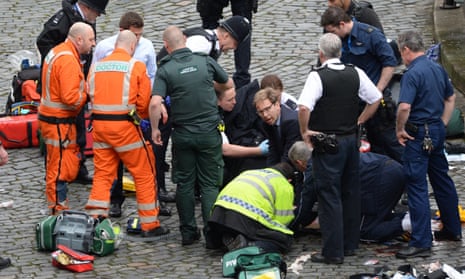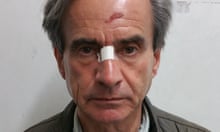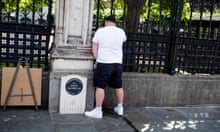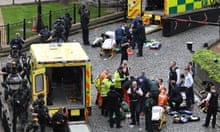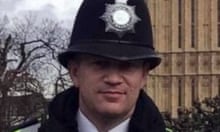Would you have got out of the car?
The car, that is, inside which then-acting Metropolitan police commissioner Sir Craig Mackey locked himself, as a man armed with a butcher’s knife murdered one of his officers before his eyes. The car from which Mackey instinctively wanted to leap, he told the inquest this week into PC Keith Palmer’s death, before deciding that – as he was in shirtsleeves with no police radio or protective kit, and was accompanied by two “distressed” civilians – the best thing was to drive away and focus on co-ordinating Scotland Yard’s response to what was evidently a terrorist attack.
As he was deciding this, an armed ministerial bodyguard who had been waiting nearby was running towards the scene to shoot dead the attacker, Khalid Masood. The defence minister and former soldier, Tobias Ellwood, having heard screams and seen people fleeing, was also running towards the scene and would go on to try to resuscitate a dying Palmer.
Ellwood is a hero. So is the unnamed close protection officer, who probably saved countless more lives by stopping Masood so quickly. And so was Wayne Marques, the British Transport Police officer who bravely ran at two knife-wielding men during a previous terror attack at Borough Market, armed with nothing but a truncheon. But Mackey ended up in the Sun under the headline “Commander Coward”, while mocked-up images of him being presented with a white feather circulate online.
I don’t think I would have wanted to get out of the car. I don’t know for sure, because nobody knows how they’ll react in a life-threatening situation until it happens. Instinct takes over in the split second available to take a decision – Mackey estimated the whole series of events, from seeing Masood to him being shot, unfolded in less than 80 seconds – and until those instincts are tested you don’t know what they are. And the natural response, at least for those lucky enough to have never seen anything like this, is to freeze as much in disbelief as fear. Can this be real?
Last year, when the comedian Simon Brodkin rose from the floor at the Conservative party conference to hand Theresa May a fake P45, there was a split second in which everyone in the audience noticed a commotion near the podium and feared it meant something much more deadly. In that split second, I learned that it takes a surprisingly long time to accept the evidence of your own eyes. By the time your brain has caught up, it’s too late. Yet in that same split second, a close protection officer would have had to decide whether to reach for their gun. The point of police or army training is, at least in part, to get past instinctive but unhelpful reactions, whether fear or trigger-happiness.
Physical courage doesn’t necessarily belong to the people you expect, either. It was one of my more mild-mannered colleagues who bravely waded into an ugly confrontation on a late-night train (and ended up being hospitalised for his pains).
And years ago, when I was jumped from behind by a man in a deserted Tube corridor, the only person who came to help me when I screamed was a tentative middle-aged woman. When she led me, shaking and crying, out on to a nearby platform it turned out to be full of strapping men looking sheepishly at their shoes. They must have heard, and I have often wondered if they did nothing out of fear or indifference, or more likely a sort of social awkwardness; thinking that perhaps this was just some hysterical couple fighting, so best not get involved. Was my female rescuer just a better judge of when a scream really is a scream? Doubtless some of the armchair generals now raging against Mackey might disappoint themselves were they ever to find themselves in the line of fire.
All these are reasons for civilians not to judge Mackey harshly. He could easily have been killed had he got out of the car, or drawn Masood’s murderous attention towards his colleagues, and either way it would have been too late to save poor Palmer. And who knows what survivor guilt or shame Mackey may already be carrying into his forthcoming retirement? Even Ellwood has described being haunted by his failure to save the dying officer, although he surely has nothing for which to reproach himself. It seems cruel to heap trauma upon trauma in the understandable search for someone to blame.
But the anger of rank-and-file officers is different. Whether Mackey’s decision to stay in the car was right or wrong, the uncomfortable truth is that it was contrary to the culture in which he operates. Both the military and the emergency services pride themselves on running towards danger when everyone else is running away. The immense physical courage required to do so, however, relies on feeling that your mates will always back you up, regardless of the cost to themselves and, crucially, also on leadership from the front.
Like first world war soldiers forced to go over the top while their generals sat back safely at headquarters, what apparently most enrages those officers now condemning Mackey is a sense that their own leaders wouldn’t do what is asked of them every day, and that perhaps speaks to a more deep-rooted sense of betrayal going back years.
It’s horribly unfair to call Craig Mackey a coward, particularly from the safety of civilian armchairs. He made what was in all probability the rational decision. But it does not, somehow, look like the decision of a leader.
